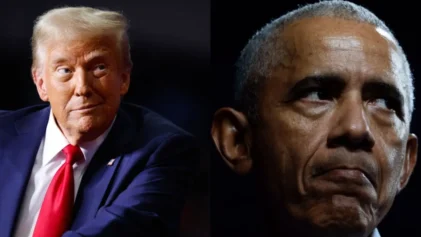President Obama is in the midst of a major shift in the nation’s war on terror, as he prepares to give a speech today in which he will announce that his administration will be restricting the use of the controversial unmanned drone strikes. He will also be renewing his efforts to close Guantanamo Bay prison in Cuba, according to a report in the New York Times.
The president’s change in strategy comes a day after U.S. Attorney General Eric Holder sent a letter to Congress acknowledging for the first time that the U.S. killed four Americans in drone strikes over the past four years.
Holder’s letter was sent to the Senate Judiciary Committee and in it he defended the targeted killing of Anwar al-Awlaki. But he said Awlaki’s 16-year-old son, as well as two other individuals, were “not specifically targeted by the U.S.”
The new policy signed by Obama will sharply curtail the instances when unmanned aircraft can be used for attack in places that are not overt war zones, countries like Pakistan, Yemen and Somalia. These new rules will impose the same stringent standard for strikes on foreign enemies that are now used only for American citizens deemed to be terrorists.
In the letter to Congress, Holder said lethal force will be used only against targets who pose “a continuing, imminent threat to Americans” and cannot feasibly be captured.
Analysts predict that this new standard could end the strikes on groups of unknown men based only on their presumed status as members of al-Qaida or some other enemy group. Administration critics say this is the approach that has resulted in many civilian casualties.
According to some estimates, the CIA and the U.S. military have undertaken more than 300 drone strikes and killed about 2,500 people — many of them civilians. The Bureau of Investigative Journalism estimates that between 2004 and 2013, CIA drone attacks in Pakistan killed as many as 3,461 people — up to 891 of them civilians.
The United States drone strikes in Pakistan are a violation of that nation’s sovereignty, the head of a U.N. team investigating the legality of the U.S. drone program, Ben Emmerson, the U.N. special rapporteur on counterterrorism and human rights, said after he made a secret fact-finding trip to Pakistan and met with officials there.
In today’s speech at the National Defense University, Obama is expected to renew his long-stalled effort to close the prison at Guantanamo Bay by making a fresh push to transfer detainees to home countries and to lift the ban on sending some back to Yemen. The president is expected to reappoint a high-level State Department official to oversee the effort to reduce the prison population.
According to administration officials, in his speech the president will “discuss why the use of drone strikes is necessary, legal and just, while addressing the various issues raised by our use of targeted action.”
The Pentagon has already started taking over responsibility from the CIA for drone strikes outside Pakistan.
In his letter, Holder wrote that “the president has directed me to disclose certain information that until now has been properly classified.” He justified the killing of Awlaki, whom he described as a “senior operational leader” of al-Qaida in the Arabian Peninsula (AQAP), by saying he was “intimately involved in detailed planning and putting in place plots against U.S. persons.”
Born in New Mexico, Awlaki was killed in a missile strike from an unmanned plane in Yemen in September 2011. While U.S. officials at the time announced his death, they did not officially reveal he was killed by a drone.
Samir Khan, a naturalized U.S. citizen who produced an online magazine promoting al-Qaida’s ideology, died in the same missile strike, while Awlaki’s 16-year-old son Abdulrahman, who was born in Colorado, was killed in Yemen a month later.
Jude Kenan Mohammad, a North Carolina resident with a Pakistani father and an American-born mother, is thought to have died in a strike in November 2011 in Pakistan’s South Waziristan region.
In his speech, the president is expected to turn a new page, rejecting the notion of a perpetual war with terrorists and envisioning a day when al-Qaida has been so incapacitated that wartime authority will end. But apparently the president doesn’t think that day has yet arrived. A Pentagon official suggested last week that the current conflict could continue for 10 to 20 years.
Senator Jack Reed of Rhode Island, a top Democrat on the Armed Services Committee, told the Times that after more than a decade of war it was time to “rebalance” the missions of the Pentagon and C.I.A. “The policy is intended to refocus the activities of the intelligence community to collection, which is crucial,” he said.
But an aide to Republican Rep. Howard P. McKeon of California, chairman of the Armed Services Committee, said his boss would insist on “concrete answers” about what Obama planned to do with “terrorists who are too dangerous to be released” from Guantanamo.
Left-leaning critics contend that the president isn’t going far enough.
“The Obama administration continues to claim authority to kill virtually anyone anywhere in the world under the ‘global battlefield’ legal theory and a radical redefinition of the concept of imminence,” said Zeke Johnson of Amnesty International. “President Obama should reject these concepts in his speech tomorrow and commit to upholding human rights, not just in word but in deed.”


